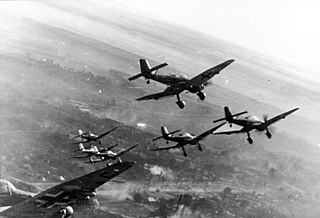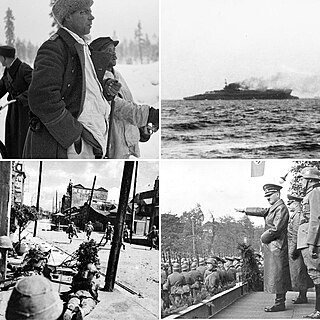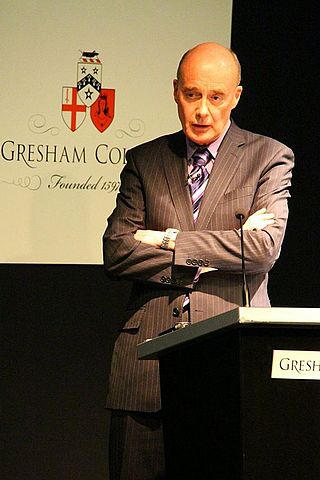Related Research Articles

The Soviet Union, officially the Union of Soviet Socialist Republics (USSR), was a transcontinental country that spanned much of Eurasia from 1922 to 1991. A flagship communist state, it was nominally a federal union of fifteen national republics; in practice, both its government and its economy were highly centralized until its final years. It was a one-party state governed by the Communist Party of the Soviet Union, with the city of Moscow serving as its capital as well as that of its largest and most populous republic: the Russian SFSR. Other major cities included Leningrad, Kiev, Minsk, Tashkent, Alma-Ata, and Novosibirsk. It was the largest country in the world, covering over 22,402,200 square kilometres (8,649,500 sq mi) and spanning eleven time zones.

World War II or the Second World War, often abbreviated as WWII or WW2, was a global conflict that lasted from 1939 to 1945. The vast majority of the world's countries, including all of the great powers, fought as part of two opposing military alliances: the Allies and the Axis. Many participants threw their economic, industrial, and scientific capabilities behind this total war, blurring the distinction between civilian and military resources. Aircraft played a major role, enabling the strategic bombing of population centres and the delivery of the only two nuclear weapons ever used in war. World War II was by far the deadliest conflict in history, resulting in an estimated 70 to 85 million fatalities, mostly among civilians. Tens of millions died due to genocides, starvation, massacres, and disease. In the wake of the Axis defeat, Germany and Japan were occupied, and war crimes tribunals were conducted against German and Japanese leaders.

Gabriel Gorodetsky is an Israeli academic who is the Quondam Fellow of All Souls College, Oxford, and emeritus professor of history at Tel Aviv University. Gorodetsky studied History and Russian Studies at the Hebrew University in Jerusalem and went on to obtain his Ph.D degree under the supervision of British historian E. H. Carr in Oxford. He was the director of the Cummings Center for Russian Studies at Tel Aviv University from 1991–2007. He has been a visiting fellow of St. Antony's College in Oxford in 1979 and in 1993, of the Woodrow Wilson International Center for Scholars in Washington in 1986, of All Souls in Oxford in 2006, and a visiting scholar at the Institute for Advanced Study in Princeton. Gorodetsky was also a visiting professor at the universities of Munich and Cologne, and at the Central European University in Budapest. In 2010 Gorodetsky received an honorary doctorate from the Russian State University for the Humanities in Moscow.

The military history of Russia has antecedents involving Kievan Rus' and the Rus' principalities that succeeded it, the Mongol invasion of the early 13th century, Russia's numerous wars against Grand Duchy of Lithuania, Crown of the Kingdom of Poland, Sweden, and Ottoman Empire, Prussia, France. The 20th century saw Russia's involvement in two world wars, as well as smaller military conflicts. During the Cold War, the greatly enlarged armed forces suppressed rebellions in Eastern Europe and became a nuclear superpower hostile to NATO, as well as China after 1960. The post-Cold War military history of the Russian Federation began in 1991.

Russia–United Kingdom relations, also Anglo-Russian relations, are the bilateral relations between Russia and the United Kingdom. Formal ties between the courts started in 1553. Russia and Britain became allies against Napoleon in the early-19th century. They were enemies in the Crimean War of the 1850s, and rivals in the Great Game for control of central Asia in the latter half of the 19th century. They allied again in World Wars I and II, although the Russian Revolution of 1917 strained relations. The two countries were at sword's point during the Cold War (1947–1989). Russia's big business tycoons developed strong ties with London financial institutions in the 1990s after the dissolution of the USSR in 1991.

This is a timeline of events of World War II in 1939, from the start of the war on 1 September 1939. For events preceding September 1, 1939, see the timeline of events preceding World War II.

David Reynolds, is a British historian. He is Emeritus Professor of International History at Cambridge University and a Fellow of Christ's College, Cambridge. He attended school at Dulwich College on a scholarship and studied at Cambridge and Harvard Universities. He has held visiting posts at Harvard, Nebraska and Oklahoma, as well as at Nihon University in Tokyo and Sciences Po in Paris.
Robert William Davies, better known as R. W. Davies or Bob Davies, was a British historian, writer and professor of Soviet Economic Studies at the University of Birmingham.

On 11 December 1941, four days after the Japanese attack on Pearl Harbor and the United States declaration of war against the Japanese Empire, Nazi Germany declared war against the United States, in response to what was claimed to be a series of provocations by the United States government when the U.S. was still officially neutral during World War II. The decision to declare war was made by Adolf Hitler, apparently offhand, almost without consultation. It has been referred to as Hitler's "most puzzling" decision of World War II. Publicly, the formal declaration was made to American Chargé d'Affaires Leland B. Morris by German Foreign Minister Joachim von Ribbentrop in the latter's office. Later that day, the U.S. declared war on Germany, with Germany's action having eliminated any remaining meaningful domestic isolationist opposition to the U.S. joining the European war.

This is a bibliographyof works on World War II.
Stephen Leonard White is British political scientist and historian, emeritus professor at University of Glasgow, an author of many articles and books about politics of Soviet Union and Russia.
This is a select bibliography of post World War II English language books and journal articles about the Revolutionary and Civil War era of Russian (Soviet) history. The sections "General Surveys" and "Biographies" contain books; other sections contain both books and journal articles. Book entries may have references to reviews published in English language academic journals or major newspapers when these could be considered helpful. Additional bibliographies can be found in many of the book-length works listed below; see Further Reading for several book and chapter length bibliographies. The External Links section contains entries for publicly available select bibliographies from universities.
This is a select bibliography of post World War II English language books and journal articles about Stalinism and the Stalinist era of Soviet history. Book entries have references to journal reviews about them when helpful and available. Additional bibliographies can be found in many of the book-length works listed below.
This is a select bibliography of English language books and journal articles about the post-Stalinist era of Soviet history. A brief selection of English translations of primary sources is included. The sections "General Surveys" and "Biographies" contain books; other sections contain both books and journal articles. Book entries have references to journal articles and reviews about them when helpful. Additional bibliographies can be found in many of the book-length works listed below; see Further Reading for several book and chapter-length bibliographies. The External Links section contains entries for publicly available select bibliographies from universities.

Below is a list of post World War II scholarly books and journal articles written in or translated into English about communism. Items on this list should be considered a non-exhaustive list of reliable sources related to the theory and practice of communism in its different forms.
This is a select bibliography of post World War II English language books and journal articles about the Russia during the First World War, the period leading up to the war, and the immediate aftermath. For works on the Russian Revolution, please see Bibliography of the Russian Revolution and Civil War. Book entries may have references to reviews published in English language academic journals or major newspapers when these could be considered helpful.
This is a select bibliography of English language books and journal articles about the Soviet Union during the Second World War, the period leading up to the war, and the immediate aftermath. For works on Stalinism and the history of the Soviet Union during the Stalin era, please see Bibliography of Stalinism and the Soviet Union. Book entries may have references to reviews published in English language academic journals or major newspapers when these could be considered helpful.

This is a select bibliography of English-language books and journal articles about the history of Ukraine. Book entries have references to journal reviews about them when helpful and available. Additional bibliographies can be found in many of the book-length works listed below. See the bibliography section for several additional book and chapter-length bibliographies from academic publishers and online bibliographies from historical associations and academic institutions.
David Russell Stone is an American military historian and the William Eldridge Odom Professor of Russian Studies in the Strategy and Policy Department at the U.S. Naval War College.
Konstantin Rudnev (1911–1980) was a Soviet politician who held various cabinet and public posts. He was the long-term minister of instrument making, automated equipment, and control systems between 1965 and 1980. He played a significant role in the Soviet missile and space programs.
References
- ↑ "University of Glasgow - Staff: Evan Mawdsley". gla.ac.uk. University of Glasgow . Retrieved 18 May 2018.
- ↑ "The Great Patriotic War: 55 years on". BBC News. BBC. 12 May 2000. Retrieved 18 May 2018.
- ↑ "Evan Mawdsley". yalebooks.co.uk. Yale University Press . Retrieved 18 May 2018.